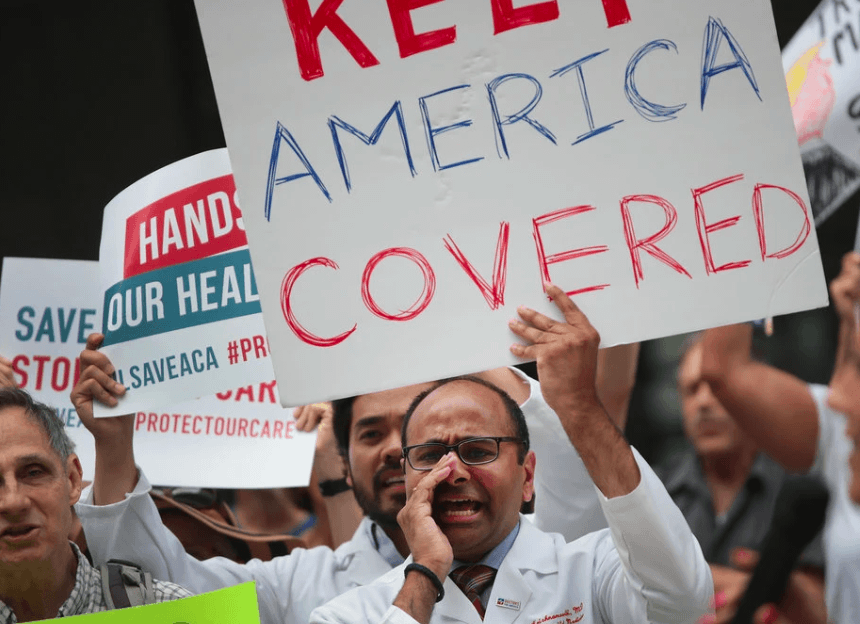Affordable Healthcare Act Repealed
December 16, 2018 | Expert Insights

A federal judge in Texas said on 14 December ruled that the Affordable Care Act's individual coverage mandate is unconstitutional and that the rest of the law, therefore, cannot stand.
Background
The Patient Protection and Affordable Care Act (PPACA), often shortened to the Affordable Care Act (ACA) or nicknamed Obamacare, is a United States federal statute enacted by the 111th United States Congress and signed into law by President Barack Obama on March 23, 2010. Together with the Health Care and Education Reconciliation Act of 2010 amendment, it represents the U.S. healthcare system's most significant regulatory overhaul and expansion of coverage since the passage of Medicare and Medicaid in 1965. The ACA's major provisions came into force in 2014. By 2016, the uninsured share of the population had roughly halved, with estimates ranging from 20 to 24 million additional people covered during 2016. The Act has also faced challenges and opposition. The Supreme Court ruled 5 to 4 in 2012 that states could choose not to participate in the ACA's Medicaid expansion, although it upheld the law as a whole. In 2017, a unified Republican government failed to pass several different partial repeals of the ACA. The law spent several years opposed by a slim plurality of Americans polled, although its provisions were generally more popular than the law as a whole, and the law gained majority support by 2017.
Analysis
A federal judge in Texas struck down the entire Affordable Care Act on 14 December on the grounds that its mandate requiring people to buy health insurance is unconstitutional and the rest of the law cannot stand without it. In his ruling, Judge Reed O’Connor of the Federal District Court in Fort Worth said that the individual mandate requiring people to have health insurance “can no longer be sustained as an exercise of Congress’s tax power.” Accordingly, Judge O’Connor said that “the individual mandate is unconstitutional” and the remaining provisions of the Affordable Care Act are invalid.
Attorney General Ken Paxton of Texas, who initiated the lawsuit, applauded the decision, saying in a statement, “Today’s ruling enjoining Obamacare halts an unconstitutional exertion of federal power over the American health care system.” He added, “Our lawsuit seeks to effectively repeal Obamacare, which will give President Trump and Congress the opportunity to replace the failed social experiment with a plan that ensures Texans and all Americans will again have greater choice about what health coverage they need and who will be their doctor.”
If Judge O’Connor’s decision ultimately stands, about 17 million Americans will lose their health insurance, which includes millions who gained coverage through the law’s expansion of Medicaid. We believe the law’s protections for people with pre-existing conditions could also be lost. Because of the high costs of America’s privatised health care system, the repeal of the affordable care act could price many people out of access to healthcare.
Counterpoint
The Texas court’s ruling will most likely not have any immediate effect. However, supporters of the law feel that it will threaten the survival of the landmark health law and, with it, health coverage for millions of Americans, protections for people with pre-existing conditions and much more.
A spokeswoman for Xavier Becerra, the California attorney general, said California and the other defendant states would challenge the ruling with an appeal in the United States Court of Appeals for the Fifth Circuit in New Orleans. “Today’s ruling is an assault on 133 million Americans with pre-existing conditions, on the 20 million Americans who rely on the A.C.A.’s consumer protections for health care, on America’s faithful progress toward affordable health care for all Americans,” Mr. Becerra said in a statement. “The A.C.A. has already survived more than 70 unsuccessful repeal attempts and withstood scrutiny in the Supreme Court.”
Assessment
Our assessment is that while the Texas court’s ruling to repeal the Affordable Healthcare Act will be contested, the ruling remains legally sound; as health insurance is not a constitutionally mandated right and it is legally unfeasible to force citizens to purchase health insurance.
India Watch
In August 2018, India's prime minister revealed what was branded as the world's largest government-funded health scheme. India’s Prime minister Narendra Modi said it would cover around half a billion people. However, there are concerns that existing facilities won't be able to handle the rise in demand, and that the programme is insufficiently funded. The controversy surrounding the affordable care act in the United States could be lessons for India: the first is of nomenclature; names such as “Obamacare” and “Modicare” make healthcare a political issue, which is counterproductive. The second is that a long-term effort in reducing avoidable cost in the supply chain is quintessential to ensure that health care is affordable to both the provider and the patient.








Comments